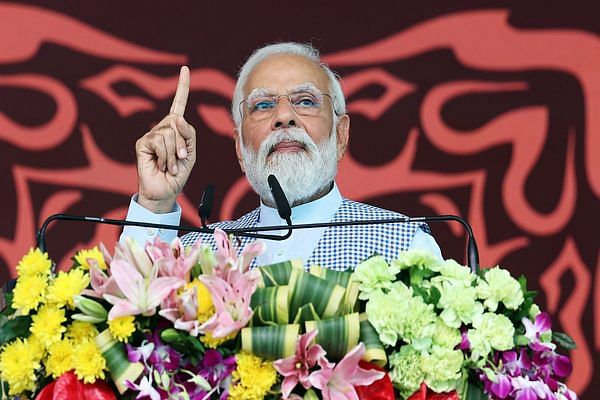Prime Minister Narendra Modi’s monthly radio show Mann Ki Baat or MKB will be completing 100 episodes on 30 April 2023. Started in October 2014, the programme was conceived as a medium to build a direct connection between the PM and citizens. Few would disagree that PM Modi has established himself as an iconic leader in terms of his ability to connect with the masses. MKB has reinforced this in a unique way — it didn’t just build an intimate connection between the PM and Indians but also reinforced ideals enshrined in the Constitution. At its core, the programme attempts to orient the mindset of citizens on issues of national importance. Endeavouring to mould the conscience of citizens, MKB has a strong social, cultural, and psychological aspect to it.
A recurring theme of the programme has been its focus on the diversity of India. An empirical study conducted by the authors evaluates the impact of MKB in fostering the feeling of ‘unity in diversity’ among people of various religions in the country. This was based on preparing a questionnaire after analysing the content of all the episodes and sharing it with university students and academics from different universities/premier institutes in India.
63 out of 99
To begin with, MKB episodes – aired live in Hindi over All India Radio (AIR) – are translated into 22 Indian languages, 29 dialects, and 11 foreign languages, thereby reaching diverse lingual groups in India and abroad. An analysis of the transcripts of all 99 episodes of MKB reveals that on 63 occasions, the PM has invoked and emphasised the importance of unity in diversity in myriad forms. These include invoking its different aspects such as vividhata (diversity), Anekta Mei Ekta (unity in diversity), Ek Bharat, Shreshtha Bharat (one India, great India), Vasudeva Kutumbakam (world is one family), Sabka Saath, Sabka Vikas, Sabka Vishwas, Sabka Prayas (cooperation of all, welfare of all, trust of all, efforts of all), Sarvajan Hitay, Sarvajan Sukhay (for benefit of all for happiness of all), to name a few.
In episode 32, the PM underlined the value of co-existence. He said, “India is a country where both theists and atheists, idolaters and those loathing idol-worship co-exist. We have adapted ourselves to myriad kinds of ideologies, different ways of worshipping, and all types of traditions and imbibed the art of co-existential living.”
Likewise, in episode 36, the PM exhorted Indians to get a ‘feel’ of the country’s vast diversity. He remarked, “I request you too to feel unity in diversity, which is not a mere slogan but a storehouse of enormous energy. The dream of Ek Bharat, Shreshtha Bharat is inherent in this…Internalise the diversities of millions of denizens of India within you. These experiences will enrich your lives…The element of unity in diversity being India’s speciality comes naturally to us. We feel proud of diversity, but have you ever tried to feel this diversity? I would like to reiterate to my countrymen, and especially to my young friends, that we are alive and aware beings. We should feel India’s diversity, touch it, feel its fragrance.”
Similarly, in episode 51, he observed, “Our festivals are replete with [the] fragrance of the essence of unity in diversity and the spirit of One India Great India.”
Moreover, it was found that PM Modi has used every year’s October episode to speak on the relevance of unity, vouch for the Ek Bharat campaign, and encourage all to participate in the Ekta Ki Daur (Run for Unity).
The results of this study can give a few insights.
Also read: Mention on Mann Ki Baat as ‘Divyang beti of Gurgaon’ was icing on cake…
MKB impact
The findings of the study revealed that the MKB had a significant positive impact in fostering feelings of unity among respondents. They show that the programme transcends the boundaries of religion in invariably influencing people belonging to different faiths.
Sixty-eight per cent of respondents admitted that after listening to the episodes, there was a positive impact on their understanding of unity in diversity. Further, the respondents with high listening frequency expressed deeper belief in the idea.
Interestingly, 70 per cent of respondents revealed that it was only through MKB that they first came to know about the centuries-old Indian concept of Vasudhaiva Kutumbakam. Moreover, these respondents also revealed that the PM’s positive references to the idea propelled them to explore more about it.
Another key finding was that the references to inter-faith understanding in MKB changed the mindset toward the festivals of ‘other’ religions. After listening to the PM’s call to celebrate festivals of other religions too, 65 per cent of respondents replied that they started perceiving those celebrations as ‘Indian festivals’ and not merely belonging to a particular religion. Further, for 75 per cent of respondents, MKB was instrumental in instilling a sense of pride in Indian culture and linguistic diversity among respondents.
The study demonstrates how MKB has become a pivot for celebrating the diversity of the nation. It is pertinent to note that the theme of India’s G20 presidency is Vasudhaiva Kutumbakam. It will be an opportune setting for the country to showcase unity in diversity as a role model for the world.
(Note: This article has been sourced from an ICSSR sponsored study on Realising the Constitutional Ideal of Unity in Diversity: An Impact Evaluation of Mann Ki Baat)
Tariq Mansoor is former Vice-Chancellor, Aligarh Muslim University and has written the
foreword for the study. Mohammad Nasir is Assistant Professor of Law at Aligarh Muslim University. Ahmed Musa Khan is Assistant Professor of Commerce at Aligarh Muslim University. Samreen Ahmed is PhD candidate in the Department of Law, Aligarh Muslim University. Views are personal.
(Edited by Humra Laeeq)



